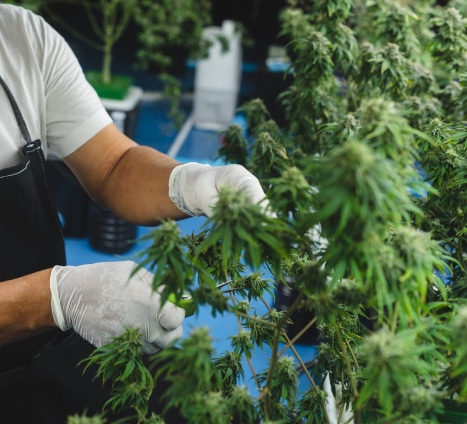How to Get a Cannabis License in Florida
In Florida, the cannabis industry is regulated primarily by the Florida Department of Health, specifically through the Office of Medical Marijuana Use (OMMU). This guide offers a detailed approach to securing a cannabis license in Florida, focusing on the medical marijuana sector as recreational cannabis remains illegal in the state.


Historical Context
Florida’s journey toward cannabis legalization has been focused on medical use. In 2016, Florida voters approved the Florida Medical Marijuana Legalization Initiative, also known as Amendment 2.
This marked a significant shift in the state’s approach to cannabis, leading to the establishment of a structured medical marijuana market along with a number of medical marijuana treatment centers.
How to Obtain a Cannabis License in Florida?
Comprehensive Research and Preparation
Market Analysis: Study the Florida medical marijuana market, its scope, and potential growth areas.
Regulatory Understanding: Stay updated with Florida’s medical marijuana regulations and compliance requirements.
Site Selection: Ensure the chosen location adheres to local zoning laws and state regulations.
Risk Assessment: Identify potential financial, regulatory, and operational risks.
Building Networks: Connect with industry stakeholders, including legal experts, suppliers, and other medical marijuana businesses.
Develop a Solid Business Plan
Outline your target market, financials, marketing strategies, and operational plans, vital for your license application.
Assemble the Necessary Documentation
Prepare all required documentation, such as an identification card or a driver’s license, business registration, details about the people who own marijuana facilities, and operational plans, ensuring compliance with Florida’s regulations.
Submitting the Application
New License Application: Apply via the OMMU to get a medical marijuana license, providing accurate details along with required documents and fees.
License Renewal: Be proactive about renewal deadlines and updating any business changes. Ensure that you fill out the online application and renewal fee before submitting a formal request for renewal.
Agent Card Requirements: For specific roles, ensure eligibility criteria are met, including background checks.
Employment Limitations: Understand restrictions related to criminal history.
Application Review and Compliance Inspection
Your application will undergo a review and a compliance inspection by regulators as per Florida law. For example, you should only sell to patients with a qualifying medical condition. A qualified patient who’s a seasonal Florida resident may be subjected to different laws.
Post-Application Steps
Once approved, begin your medical marijuana operations, ensuring ongoing compliance with Florida’s regulations.
Types of Cannabis Licenses in Florida
1. Cultivation License
Details
The Cultivation License in Florida allows for the legal cultivation of medical marijuana. This type of license is essential for businesses that intend to grow cannabis plants for use in medical marijuana products. Cultivation licensees play a crucial role in the supply chain, providing raw materials for processors and dispensaries.
Requirements
Applicants must comply with strict state regulations, including securing appropriate land use permits and meeting environmental standards. They must also implement robust security measures and adhere to the state’s tracking system for medical marijuana plants.
2. Processing License
Details
A Processing License in Florida authorizes the holder to process raw cannabis into a variety of products for medical marijuana use. This includes the extraction of cannabinoids, the production of edibles, tinctures, oils, and other medicinal forms of cannabis. Processing licensees are pivotal in diversifying the available medical marijuana products in the market.
Requirements
Processors must adhere to health and safety standards set by the state, ensuring that all products are safe for consumption and properly labeled. Facilities need to meet specific operational standards, and applicants must submit detailed plans outlining their processing methods, ingredient sourcing, and waste disposal.
3. Dispensary License
Details
The Dispensary License allows for the retail sale of medical marijuana products to qualified patients with an active medical marijuana card. Dispensaries are the primary point of contact for patients seeking products on the recommendation of a qualified physician. It’s important that dispensaries fulfill their role in patient education and product dissemination. They offer a variety of products sourced from licensed cultivators and processors.
Requirements
Dispensary applicants must adhere to stringent regulations regarding location, security, and patient verification processes. Compliance with Florida’s medical marijuana dispensing laws (such as low THC cannabis products required for appropriate treatment), maintaining accurate sales records, and adhering to patient purchase limits are essential.
4. Transportation License
Details
The Transportation License in Florida is for businesses specializing in the secure transport of medical marijuana and related products between licensed facilities. This includes transportation from cultivation sites to processing facilities and from processors to dispensaries. Transporters play a vital role in maintaining the integrity and security of the supply chain.
Requirements
Applicants must have secure transportation methods and storage facilities. They are also required to comply with tracking and reporting requirements, ensuring that all transported products are accounted for and delivered safely.
5. Testing Laboratory License
Details
A Testing Laboratory License permits the holder to test medical marijuana products for potency, contaminants, and quality control. These independent laboratories are crucial for ensuring product safety and efficacy, conducting tests for cannabinoids, terpenes, pesticides, and other possible contaminants.
Requirements
Testing facilities must meet high scientific standards, including necessary certifications and accreditations. They are required to operate independently from growers, processors, and dispensaries to ensure unbiased testing results.
5. Vertical Integration License
Details
The Vertical Integration License in Florida is a comprehensive license that allows a business to engage in multiple aspects of the medical marijuana supply chain. This includes cultivation, processing, transportation, and dispensing. It is designed for businesses that want to control all stages of production and distribution.
Requirements
Applicants must meet the combined requirements of cultivation, processing, transportation, and dispensing licenses. This includes compliance with environmental, health, and safety standards, as well as meeting the operational requirements for each aspect of the business.
Each of these licenses plays a vital role in Florida’s medical marijuana industry, and meeting their respective requirements is essential for legal operation and success in the state’s cannabis market.
Each of these marijuana licenses, including those for adult use cannabis establishments, comes with its own set of challenges and responsibilities. It’s crucial to stay updated with the ever-evolving regulations and the licenses issued, especially those related to adult use cannabis, by regularly checking the official Florida government pages. As the cannabis industry in Florida continues to flourish, ensuring compliance and understanding the nuances of each business license and type will pave the way for a successful venture.
Risk and Compliance Factors From AlphaRoot
The cannabis industry, while burgeoning with opportunities, is not without its complexities and inherent risks. Understanding and mitigating these risks is crucial for long-term success. AlphaRoot, a prominent insurance and risk management firm specializing conduct business in the cannabis sector, sheds light on the key risk and compliance factors
1. Regulatory and Legal Risks
Labyrinthine Regulations The cannabis industry is highly regulated, and compliance with state and local laws is paramount for cannabis establishments. Navigating the intricate web of regulations, which can vary significantly from one jurisdiction to another, poses a substantial challenge for cannabis establishments. Failure to comply can result in fines, license revocation, or legal consequences.
Federal Ambiguity Cannabis remains illegal at the federal level in the United States, despite state-level legalization of recreational marijuana. This dichotomy creates uncertainties and exposes businesses from where people get recreational or purchase medical marijuana to potential federal enforcement actions.
2. Financial Risks
Cash-Intensive Operations Due to federal banking restrictions, many cannabis businesses operate primarily in cash. This not only presents security risks but also complicates financial management and taxation.
Taxation Challenges Cannabis businesses face unique tax challenges, including limitations on deductions and potential audits. Understanding and complying with tax regulations is essential to avoid financial penalties.
3. Security Risks
Theft and Robbery Cannabis businesses are susceptible to theft and robbery due to the high value of their products. Implementing robust security measures at a marijuana cultivation facility, including surveillance systems and secure storage, is vital to mitigate these risks.
Cybersecurity As with any industry, cannabis businesses are vulnerable to cyberattacks. Protecting sensitive customer data and business information is critical.
4. Product Liability and Quality Control
Product Liability Claims Ensuring the safety and quality of cannabis products is crucial to prevent product liability claims. Contaminated or mislabeled products can lead to legal and financial repercussions.
Testing and Quality Assurance Collaborating with reputable independent testing laboratory and facilities, as required by regulations, is essential to verify the safety and potency of cannabis products. Consistent quality control is essential to maintain consumer trust.
5. Market Competition and Volatility
Saturated Markets in regions with a high concentration of cannabis businesses, competition can be fierce. Navigating market saturation requires effective differentiation and marketing strategies.
Price Volatility The price of cannabis products can fluctuate significantly, impacting profitability. Businesses must adapt to market dynamics and price changes.
6. Environmental and Sustainability Concerns
Resource Intensity Cannabis cultivation and processing can be resource-intensive, including water and energy consumption. Businesses need to address sustainability concerns and adhere to environmental regulations.
Waste Management Proper waste disposal and recycling practices are essential to minimize environmental impact and meet regulatory requirements.
7. Talent and Workforce Challenges
Talent Shortages the cannabis industry often faces challenges in recruiting and retaining qualified personnel due to its specialized nature. Employee turnover can disrupt operations.
Training and Compliance Businesses must invest to ensure employees are well-informed about compliance and safety protocols.
Expert Insights
Isaac Bock, a well-known figure in the cannabis sector, emphasizes that success in Florida’s cannabis industry hinges on keeping cannabis establishment of regulations, maintaining ongoing community involvement, and upholding the highest standards of product quality.
FAQ Section
What are the qualifications needed to apply for a cannabis license in Florida?
To apply for a cannabis license in Florida, applicants must meet specific criteria set by the Florida Department of Health. These include being over the age of 21, having no felony convictions within the last five years, and demonstrating the ability to operate a business in compliance with all state laws and regulations. Additional requirements may vary based on the specific type of license being applied for, such as cultivation, processing, or dispensing.
How long does it take to get a cannabis license approved in Florida?
The time frame for cannabis license approval in Florida varies based on the type of license and the completeness and accuracy of the application submitted. Generally, it can take several months for a license to be processed and approved. The Florida Department of Health reviews each application thoroughly to ensure compliance with state regulations, which can add to the processing time.
Can a business hold multiple types of cannabis licenses in Florida?
Yes, a business can hold multiple types of cannabis licenses in Florida, especially under the Vertical Integration License, which allows for control over several aspects of the cannabis supply chain including cultivation, processing, transportation, and dispensing. However, businesses must meet all the individual requirements for each type of license they intend to hold and demonstrate their ability to comply with all relevant regulations.
Additional Resources
Visit the official websites of regulatory authorities and learn of the ever-evolving marijuana landscape in Florida.
Conclusion
To successfully acquire a cannabis license and run an adult-use dispensary in Montana, you must fulfill all the requirements and adhere to the rules and regulations enlisted by The Montana Department of Revenue.
Follow the steps mentioned in this guide, take your time, and seek professional help when needed to maximize your chances of obtaining a Montana cannabis license.